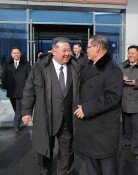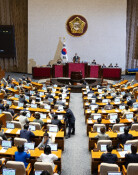Legislators at Odds over the Electoral Law Amendment
Legislators at Odds over the Electoral Law Amendment
Posted December. 22, 2003 22:58,
The ad hoc committee for political reforms, chaired by Mok Yo-sang, on December 22 failed to reach an agreement on the amendment bill of electoral and political fund regulations as the pro-president Uri Party opposed voting on some revisions, citing them as retrogressive reforms.
About 30 Uri Party members of the special committee staged a one-day protest in the main conference hall of the National Assembly building, demanding the withdrawal of the political reform bill.
In the meeting on December 22, the three opposition parties, the Grand National Party (GNP), the Millennium Democratic Party (MDP), and the United Liberal Democratic Party (ULDP) agreed to: 1) the current one-member electoral precinct system; 2) an increase in the population ceiling of a precinct from 90,000-100,000 to 100,000-300,000; and 3) an increase of the number of elected lawmakers to 243 from 227, while the Uri Party demanded the introduction of new two- or three-member precincts and the maintenance of the current level of National Assembly body by allowing single-member precincts in rural areas and multi-member precincts in urban areas.
Earlier, in a meeting of administrative secretaries of the committee, they withdrew a bill aimed at substantially reducing the National Election Committees watchdog power to collect evidence related to electoral crimes and records of campaign funds from electoral candidates, as the scheme elicited public criticism.
While the ad hoc committee rescinded a bill on the misfeasance of the electoral watchdog, it is attempting to repeal the clauses of the election law carrying jail terms or penalties and replace them with ones with fines.
While the committee will let the electoral regulatory body to keep the clauses allowing it to subpoena candidates and their records, which it initially planned to take away, the lawmakers will attempt to replace the maximum two-year jail term or the maximum penalty of four million won that the clause carries as punishment for non-compliance with the maximum fine of three million won.
The committee plans to work out an agreement about the issues on which its members find themselves at odds -- the revision of precincts, the number of legislators and the size of a precinct -- at a general meeting on December 24.
Commenting on the committees plans, the Uri Party said in a meeting of its lawmakers, The GNP and the MDP are scheming to retrogressively change the political acts. It added, If the bills are passed at the National Assembly, the president should veto it.
As President Roh has repeatedly said, the National Assembly should be more serious about resolving regional bias, presidential spokesman Yun Tai-young said in what appears to be a coded way of demanding the introduction of multi-member precincts.
The president is entitled to his own opinion. However, since the legislative power lies exclusively with the National Assembly, he should not intervene, said ad hoc committee chairman Mok.
Sung-Won Park Ho-Won Choi swpark@donga.com bestiger@donga.com







